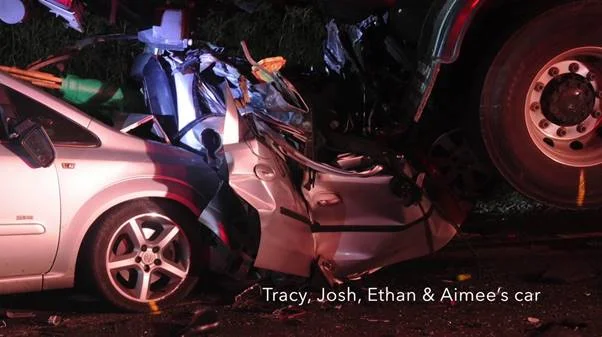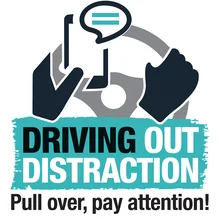
Driving out Distraction: Is mobile phone use an addiction insurers should worry about?

On 10 August 2016 Tomasz Kroker was driving a truck on the A34 – ahead of him was a very visible long queue of traffic travelling uphill. The truck was travelling at 50mph, and Kroker made no attempt to reduce speed when he hit the first vehicle driven by Adam Pearson. Adam narrowly escaped death and suffered life changing injuries.
Adams’ vehicle was pushed into the van in front which turned sideways and created a braking action into the car ahead driven by Mark Goldsmith which in turn was pushed into his partner’s (Tracy Houghton) vehicle. Tracy’s Corsa was pushed under the lorry in front and reduced one-third of its normal size.
Kroker, from Trajan Walk, Andover, Hampshire, had been so distracted he barely looked at the road for almost a kilometre. He was scrolling through music selections on his phone at the time of the crash. On 31 October 2016 Kroker was sentenced to 10 years imprisonment for the deaths of Aimee (11), Josh (11), Ethan (13) & Tracy (45)
During his sentencing at Reading Crown Court, Judge Maura McGowan said the lorry driver’s attention had been so poor he “might as well have had his eyes closed”.
Thames Valley Police, with the support of the families, released a video of the crash to educate & to deter drivers from using a phone [warning this video contains some disturbing scenes].
Three years later the issue of using a phone while driving remains an issue and insurers’ figures show in excess of 20% of all collisions are as a direct result of driver distraction.
Writing in Post last year Aviva’s CEO Maurice Tulloch compared driving distracted to drink driving saying: “It is crucial to make distracted driving as socially unacceptable as it is to drink and drive. Let’s all put distractions aside, focus and enjoy the journey.”
Kate Goldsmith (mother of Aimee) wants to see the eradication of mobile phones use while driving and is supporting Post’s Driving out Distraction campaign which encourages people to pay attention to the road and pull over if they need to use their phones.
The campaign aims to lobby insurance companies and their customers (especially fleet drivers) to embrace proactive measures to block the use of phones and work together to incentivise drivers to overcome this terrible habit. Furthermore encourage the government to go further with its proposals.

Support
Egertons Recovery Group has already pledged its support for the campaign. Mark Egerton, founder of Egertons, said: “We act on behalf of a number of UK police forces and the Highways Agency, along with several major insurers and large fleet users.
“Frequently collisions we attend involve serious injury and fatalities and an increasing number are as a direct result of drivers being distracted by use of a mobile phone. We were instructed to attend by the police on the A34 at the scene of the Tomasz Kroker collision in 2016.
“The consequences of such horrific events are heart breaking, unbearable and far reaching. Clearly this was life changing and horrific for the bereaved families but also the emergency services, our staff and the other emergency services and members of the public at the scene. The Kroker collision traumatised our staff and many other people and three years on it is still as vivid and shocking as ever.
“Egertons is proud of our stance to mandate and to protect our employed drivers. Protecting third parties too. By using a small and inexpensive device in our fleet of vehicles to block the physical use of a smartphone while driving. We are also encouraging our fleet customers to follow our lead.”
Alice Cooper, corporate partnerships officer at Brake Road Safety Charity, which is supporting the campaign added: “Using a phone when behind the wheel can impair you as much as driving drunk - a car is a lethal weapon and it only takes a moments inattention to result in devastating consequences.
“Drivers need to understand that no call, text or social media update is worth risking a life.”
Rachel Stow, managing director of Thorneycroft Solicitors and DoD signatory, said: “Our specialist team of motorcycle lawyers are all too familiar with the tragic consequences of driver distraction and mobile phone usage. Those on two wheels are vulnerable road users. Bikers are less visible by their very nature and even with all of the correct safety equipment they are still more likely to sustain serious and catastrophic injury if hit by a vehicle. Mobile phone distraction is entirely avoidable and individuals and companies should all be taking responsibility, ultimately we have a legal and moral duty of care.”
Holland-based Safe Drive Pod is one company helping to combating mobile phone use with device that blocks the use of phones in a moving vehicle and believes the UK is behind Europe in stamping out this problem. Its customers include big fleet firms including G4S, Heineken, Initial Rentokil, insurance firm Tryq in Denmark and leasing companies like Volkswagen Financial Services AG, which understand their responsibility as a fleet owner to care about their employees.
According to Initial Rentokil in Holland it has seen collisions reduce by 24.7% after employees were mandated to use Safe Drive Pod.
Paul Hendriks, founder of Safe Drive Pod, added: “Far too often companies recognise the addiction to phone use but are reluctant to take action. This is despite, on a global scale, an increase in road accidents because of smartphone use. 10 years ago this problem didn’t exist and now it is the number one cause of accidents.
“It is our wish that every new driver on the road will be the new generation and always use safety products in exactly the same way as seatbelts. Every parent, every company owner and every insurance company has to take action – to protect their employees, customers, families and all road users.
“Since 2013 an increase in deadly accidents in Europe is because of physical smartphone use and not because of handsfree calling. The government and insurers in the UK should focus initially with banning and blocking texting”.

Join the campaign
Want to do something to help and support Post’s Driving out Distraction campaign? Sign up as a supporter and spread the word that you are doing your bit by committing not to use your phone while driving using #DrivingOutDistraction and #PayAttentionPullOver or get your firm to commit to our pledge to stop mobile phone use in company cars.
Only users who have a paid subscription or are part of a corporate subscription are able to print or copy content.
To access these options, along with all other subscription benefits, please contact info@postonline.co.uk or view our subscription options here: https://subscriptions.postonline.co.uk/subscribe
You are currently unable to print this content. Please contact info@postonline.co.uk to find out more.
You are currently unable to copy this content. Please contact info@postonline.co.uk to find out more.
Copyright Infopro Digital Limited. All rights reserved.
As outlined in our terms and conditions, https://www.infopro-digital.com/terms-and-conditions/subscriptions/ (point 2.4), printing is limited to a single copy.
If you would like to purchase additional rights please email info@postonline.co.uk
Copyright Infopro Digital Limited. All rights reserved.
You may share this content using our article tools. As outlined in our terms and conditions, https://www.infopro-digital.com/terms-and-conditions/subscriptions/ (clause 2.4), an Authorised User may only make one copy of the materials for their own personal use. You must also comply with the restrictions in clause 2.5.
If you would like to purchase additional rights please email info@postonline.co.uk







